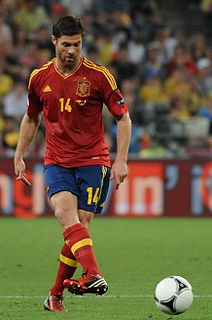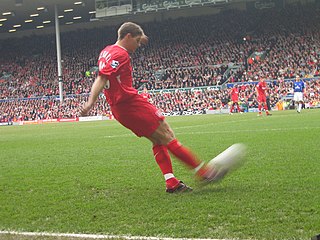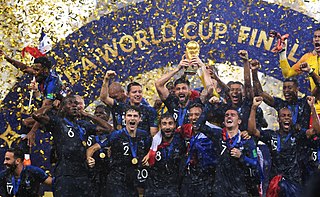
Edson Arantes do Nascimento, KBE, known as Pelé, is a Brazilian retired professional footballer who played as a forward. He is widely regarded as one of the greatest players of all time. In 1999, he was voted World Player of the Century by the International Federation of Football History & Statistics (IFFHS), and was one of the two joint winners of the FIFA Player of the Century award. That same year, Pelé was elected Athlete of the Century by the International Olympic Committee. According to the IFFHS, Pelé is the most successful domestic league goal-scorer in football history scoring 650 goals in 694 League matches, and in total 1281 goals in 1363 games, which included unofficial friendlies and is a Guinness World Record. During his playing days, Pelé was for a period the best-paid athlete in the world.

Gerhard "Gerd" Müller is a German retired footballer. A prolific striker renowned for his clinical finishing, especially in and around the six-yard box, he is regarded as one of the greatest players and goalscorers of all time.
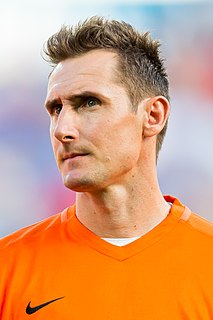
Miroslav Josef Klose is a German retired footballer who played as a striker. Klose is the coach of the U17 youth team at Bayern Munich.
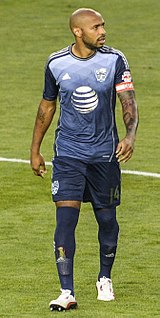
Thierry Daniel Henry is a French professional football coach and former player who was most recently the manager of Ligue 1 club Monaco.

Raúl González Blanco, known as Raúl, is a Spanish football manager and former player who played as a striker. He is the current manager of Real Madrid Castilla. Raúl is considered one of the most important players in the history of Real Madrid and regarded as one of the greatest Spanish players of all-time.
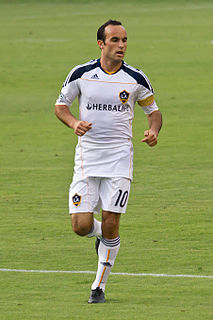
Landon Timothy Donovan is an American professional soccer player who plays for Major Arena Soccer League side San Diego Sockers. He holds numerous individual records in Major League Soccer (MLS) and for the United States national team and is regarded as one of the greatest U.S. men's soccer players of all time.

Mario Alberto Kempes Chiodi is a retired Argentine footballer who played as a striker. His father, Mario, also a footballer, inspired him to play from a young age. At the age of seven he began playing with a junior team and at fourteen, he joined the Talleres reserves. A prolific goalscorer, at club level he is best known for playing for Valencia, finishing as La Liga's top goalscorer twice, and amassing 116 goals in 184 league games for the club.

Romário de Souza Faria, known simply as Romário, is a Brazilian politician who previously achieved worldwide fame as a professional footballer. A prolific striker renowned for his clinical finishing, he is regarded as one of the greatest players of all time. Romário starred for Brazil in their 1994 FIFA World Cup success, receiving the FIFA Golden Ball as player of the tournament. He was named FIFA World Player of the Year the same year. He came fifth in the FIFA Player of the Century internet poll in 1999, was elected to the FIFA World Cup Dream Team in 2002, and was named in the FIFA 100 list of the world's greatest living players in 2004.

Teófilo Juan Cubillas Arizaga is a Peruvian former footballer who played as an attacking midfielder. He was selected as Peru's greatest ever player in an IFFHS poll, in which he was also included in the world's Top 50. He was renowned for his technique, shooting ability and free kick ability.

Oleg Anatolyevich Salenko is a retired Russian-Ukrainian footballer who played as a forward. He scored a record five goals in a group-stage match in the 1994 World Cup, helping him earn the Golden Boot as joint-top tournament goalscorer.

Dimitar Ivanov Berbatov is a retired Bulgarian professional footballer. A striker, he captained the Bulgaria national team from 2006 to 2010, and is the country's all-time leading goalscorer. He has also won the Bulgarian Footballer of the Year a record seven times, surpassing the number of wins by Hristo Stoichkov.
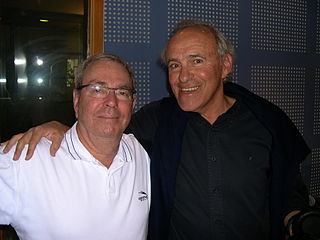
Mordechai "Motaleh" Shpigler is a former Israeli footballer and manager. He remains Israel's record goalscorer, with 33 goals in 83 caps.

Marta Vieira da Silva, commonly known as Marta, is a Swedish-Brazilian footballer who plays for the Orlando Pride in the National Women's Soccer League and the Brazil national team as a forward. With 17 goals, she holds the record for most goals scored at FIFA World Cup tournaments. Moreover, she is the first footballer of either sex to score at five World Cup editions, followed by Christine Sinclair.
At the end of each FIFA World Cup final tournament, several awards are presented to the players and teams which have distinguished themselves in various aspects of the game.
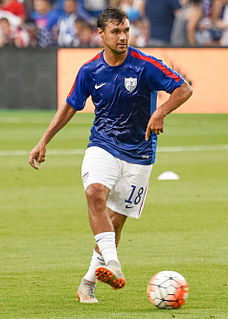
Christopher Elliott Wondolowski is an American soccer player who plays for San Jose Earthquakes as a forward. Wondolowski was MLS's top scorer in the 2010 and 2012 seasons, also being named the 2012 Most Valuable Player, and has become one of the top strikers in Major League Soccer.
Carin Leslie Jennings-Gabarra, née Carin Jennings, is an American retired soccer forward. She earned 117 caps with the United States women's national soccer team from 1987 to 1996 and was awarded the Golden Ball Award as the best player at the 1991 FIFA Women's World Cup. In 2000, she was inducted into the National Soccer Hall of Fame. She currently coaches women's soccer at the United States Naval Academy.

Pierre-Emerick Emiliano François Aubameyang is a professional footballer who plays as a forward for Premier League club Arsenal, where he is vice-captain, and is the captain of the Gabon national team. Often considered one of the best forwards in the world, he is known for his pace, finishing, and off-ball movement. Aubameyang plays mainly as a striker, but has also been deployed as a wide forward.
At the end of each FIFA Women's World Cup final tournament, several awards are presented to the players and teams which have distinguished themselves in various aspects of the game.



